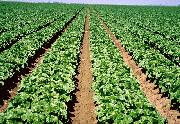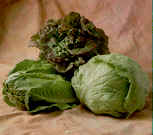|
1.
Is FRESH
FIELD
organic ?
I
like to argue that our growing method incorporates
the best of organic and inorganic farming. To be organic,
gardening practice should contain the following
features:
|
Organic
|
At
Lettuce Entertain You ...
|
|
no
chemical herbicides, pesticides
|
We use botanical repellant,
inter-cropping and mechanical preventive methods.
|
|
no
chemical fertilizers (using municipal sewage
sludge is not organic)
|
We
use
the purest form of chemical
fertilizers available for agricultural
application. These are the same chemicals
found
in soil and organic compost. The only
difference between organic and inorganic
fertilizer is in the manner in which they
are manufactured.
|
|
should
improving the soil structure and its level
of organic matter by applying organic
compost and other natural fertilizers
|
We
use soilless culture.
|
|
should
discourage soil erosion and must boost
nutrient levels in soil
|
We
use soilless culture.
|
|
should
minimizing damage to soil structure
|
We
use soilless culture.
|
|
genetically
modified or Bt seeds should not be use
|
At
Lettuce Entertain You Farm Corporation,
we grow our plants using F1, Hybrid seeds
and not genetically
modified or Bt seeds.
|
2.
Are vegetables / herbs from hydroponic culture safe
?
|
Tissue
analyses of vegetables grown in the soil and by
different types of soil-less system have shown that
there is no significant difference in the various
macronutrients and micronutrients among the
vegetables grown using the different methods.
In the case of vegetables,
consumers' key apprehension about eating vegetables
grown by soil-less system are in two areas, and they
are right to be concerned.
Once
concern relates to whether vegetables grown by
soil-less systems accumulate excessive amount of
chemicals so that they become harmful to human
health. This view is derived from the
observation that the roots of the vegetables are
exposed to artificial chemicals all the time. |

|
|
There
is a general perception that because nutrient
formulations for soil-less system contains a mixture
of different chemicals, the formulations are
artificial as the chemicals used are
artificial. However, in reality, there is
really no such thing as artificial chemicals when
it comes to plant nutrition. |
Plants
absorb minerals from
the soil for healthy growth. Soil scientist
and plant physiologist have, for years, conducted
extensive research to establish the range and
quantum of such minerals which the plants absorbs
from the soil. It is based on these findings
that nutrient formulations are developed for
soil-less cultures. The formulations contain
the same minerals as those found in the soil. These minerals,
which are the basic forms of chemical compounds, are
similar to those present in the soil.
Therefore, the nutrient solutions do not contain artificial
chemicals as the mineral components are exactly
similar to those found in soil.
|

|
The
second concern is that since the nutrient solution
is artificially formulated, will the vegetables
grown by the soil-less system lack certain
micronutrients as compared to those grown in the
soil.
Studies
showed that the two concerns were not valid as there
was no significant difference in the macronutrients
and micronutrients accumulated in he tissues of the
vegetables, irrespective of the growing methods.
As expected, the plants would absorb the same
mineral from the soil or from the nutrient solution
since the nutrient solution contains the same
essential minerals which the plants need.
|
The
results were published in the ASEAN FOOD JOURNAL
Volume 10. And these results were consistently
supported by studies conducted at the Singapore
Polytechnic.
The Dutch have shown us how
safe it is to eat greens grown by soil-less systems.
To build up its horticultural industry and to
fulfill the need for greens, the Dutch has developed
soil-less systems for extensive greens produced in
glasshouses.
For
several decades, the Dutch have been consuming
lettuces, tomatoes, peppers and other greens grown
by soil-less system.
Besides,
we have not read of any adverse health reports on
the Dutch population so far, have we ?
3.
Are
vegetables / herbs from hydroponic culture
considered genetically modified foods ?
 |
A
very big no. The type of culture does not
transform a plant into a genetically modified
food product. Genetically
modified food is a food where genes
between unrelated species exist. This is
totally different from hybridization where
cross-breeding is limited to genes from the same
families.
What
hydroponics or aeroponics does is to create the most
ideal growing condition for the plant.
|
4.
What
is the difference between soil grown and hydroponic
culture with regards to providing plants with
necessary nutrients ?
| There
is no difference between plants grown under
soil less culture and those grown in
soil. In soil both the organic
and inorganic components must be decomposed
into inorganic elements, such as calcium,
magnesium, nitrogen, potassium, phosphorus,
iron and others before they are available to
plants. These elements adhere to the
soil particles and are exchanged into the soil
solution where they are absorbed by the
plants. In aeroponics or hydroponics,
the plant roots are moistened with nutrient
solution containing the elements.
|
5.
What is the effect of
hydroponic culture on the environment ?
The
major concern of environmental group when it comes
to the agricultural sector would be the soil
erosion, soil degradation, amount of chemical
pesticides injected into the environment and
agricultural waste water with fertilizer sipping
into the ground water.
At
Lettuce Entertain You Farm Corporation,
all these are "none issue".
First,
the agricultural practice does not call for the use
of soil at any stage in the plant's development.
Secondly,
the use of chemical pesticides is against our
policy.
And
finally, the water we use are recycled and
monitored. Agricultural waste water is very
minimal, if any, as this is confine only to
leakages within the irrigation system.
6.
Are hydroponic grown fresh produce less tastier than
soil grown ?
|
Have
you ever wonder why your lettuce taste bitter ?
Have you ever wonder why the tomatoes in your
supermarket bag taste like a ball of water color ?
The reasons are usually cause by farming practice
and nothing to do with the use of organic or
inorganic fertilizer nor the presence of soil.
The taste is determined either by the growth
duration of the plant and the strength of fertilizer
applied.
In
the case of hydroponic culture, grower can
manipulate these two factors to his advantage and
come up with a superb fresh produce.
|
Fresh
Field
Garden Mix Mesclun >> |
|

|
|

Lettuce
is lovely
It is divine
Eat lots of lettuce
And you will feel fine !
|
source |
7.
Why is lettuce so good to eat ?
|
Iceberg |
Leaf
Lettuce |
Romaine |
|
Serving
size |
262 g
1/2
head
|
100 g |
100 g
inner
leaf |
|
Calories |
45 |
20 |
15 |
|
Carbohydrate
(g) |
9 |
4 |
2 |
|
Fiber
(g) |
3 |
2 |
2 |
|
Protein
(g) |
3 |
1 |
2 |
|
Potassium
(mg) |
350 |
260 |
290 |
|
Sodium
(mg) |
30 |
10 |
10 |
|
Vitamin
A (% Daily Value) |
10 |
40 |
50 |
|
Vitamin
C (% Daily Value) |
20 |
30 |
40 |
|
Calcium
(%
Daily Value) |
6 |
6 |
4 |
|
Iron
(%
Daily Value) |
6 |
8 |
6 |
|
|
8.
I have noticed that if I buy a lettuce from
the supermarket, and if I buy a Fresh Field Salad
Greens bag, the bag of lettuce lasts a lot
longer. What are they doing to the lettuce in
the bag ? Are they using some sort of chemical
preservative ?
The
collection of features from our processing and
packaging procedure basically keeps our bag of mesclun
fresh longer (without any use of preservatives) by :
|

|
-
It
changes the way the green leaves behave.
The green leaves are still alive even
after you pick the lettuce, and you want
to keep them alive as long as possible by
changing their behavior;
-
It
discourages bacteria;
-
Block
the mode of action and biosynthesis of
ethylene, a ubiquitous plant hormone which
promotes aging and senescence;
-
Reduce
rots by directly inhibiting the growth of
pathogens and by maintaining the health
and integrity of the plant tissue, which
reduces its susceptibility to infection;
-
Slow
yellowing of green tissues by preventing
chlorophyll degradation; and
-
Maintain
the food, nutritional value and flavours
of the produce by slowing the loss of food
reserves, particularly sugars, inhibiting
the loss of labile vitamins such as
vitamins A and C, and by slowing the
accumulation of undesirable secondary
metabolites in the plant's tissues, such
as free ammonia.
|
|
